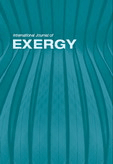
International Journal of Exergy
Scope & Guideline
Transforming Energy Research into Real-World Applications
Introduction
Aims and Scopes
- Exergy Analysis and Optimization:
The journal emphasizes the application of exergy analysis to evaluate and optimize various energy systems, including thermal power plants, refrigeration systems, and renewable energy technologies. This approach aids in identifying inefficiencies and enhancing overall system performance. - Sustainable Energy Solutions:
Research published in the journal often explores innovative solutions for sustainable energy production and consumption, integrating exergy principles in the development of systems such as solar, geothermal, and hybrid energy technologies. - Environmental Impact Assessment:
A core area of focus is the assessment of environmental impacts through entropy-based approaches, linking thermodynamic principles to sustainability metrics. This research aids in understanding the ecological consequences of energy systems. - Multi-Objective Analysis:
The journal frequently publishes studies that utilize multi-objective optimization techniques, combining energetic, exergetic, economic, and environmental analyses to design efficient and sustainable energy systems. - Emerging Technologies:
There is a consistent emphasis on the analysis of new and emerging technologies, such as advanced refrigeration cycles, nanofluids, and hybrid energy systems, showcasing the journal’s commitment to innovation in energy efficiency.
Trending and Emerging
- Integration of AI and Machine Learning:
Recent publications demonstrate a growing trend towards integrating artificial intelligence and machine learning techniques for optimizing energy systems and improving exergy analysis, indicating an intersection of computational technology with energy research. - Advanced Refrigeration and Heat Pump Technologies:
There has been a marked increase in studies exploring innovative refrigeration and heat pump systems, particularly those utilizing alternative refrigerants and hybrid cycles, reflecting a demand for more environmentally friendly cooling solutions. - Hydrogen Production and Utilization:
Research on hydrogen production, including its role in energy systems and as a fuel, is gaining momentum. This trend aligns with global efforts to develop hydrogen as a clean energy carrier, enhancing the journal's relevance in contemporary energy discussions. - Sustainable Urban Energy Solutions:
The journal is increasingly publishing studies focused on energy efficiency in urban environments, such as smart buildings and integrated energy systems, highlighting the relevance of exergy analysis in addressing urban sustainability challenges. - Exergy and Environmental Sustainability Metrics:
There is an emerging focus on linking exergy analysis with sustainability metrics, reflecting a broader interest in integrating environmental considerations into energy system assessments.
Declining or Waning
- Conventional Energy Sources:
Research focusing on traditional fossil fuel-based energy systems has decreased as the field shifts towards more sustainable and renewable energy solutions, reflecting a broader global trend towards decarbonization. - Basic Thermodynamics without Exergy Focus:
There appears to be a waning interest in studies that do not integrate exergy principles into thermodynamic analyses, as researchers increasingly recognize the importance of exergy in evaluating system efficiencies. - Static Energy Systems:
There is a noticeable reduction in publications related to static energy systems and processes, as the journal’s focus has shifted towards dynamic and integrated systems that reflect current technological advancements.
Similar Journals

International Journal of Engineering Research in Africa
Advancing Research, Inspiring SolutionsThe International Journal of Engineering Research in Africa is a pivotal academic resource for researchers, professionals, and students interested in the multifaceted field of engineering within the African context. Published by TRANS TECH PUBLICATIONS LTD, this journal facilitates the dissemination of innovative research, covering a myriad of topics in engineering, from advanced materials to sustainable practices. With an ISSN of 1663-3571 and E-ISSN 1663-4144, this publication not only fosters scholarly communication but also contributes to the global engineering discourse, as evidenced by its current Q3 ranking in the Engineering (miscellaneous) category in 2023. Operating from its base in Switzerland, the journal has been actively publishing since 2010 and continues to play a vital role in the advancement of engineering knowledge, particularly in the African landscape. Although it does not offer an open access model, the journal's commitment to quality research ensures that it remains a valuable asset for those seeking to understand and innovate within the engineering sector. Its integration in Scopus with a rank of #175 out of 307 in General Engineering further underscores its relevance and impact in the engineering community.

Wireless Power Transfer
Connecting Ideas to Energy: The Journal of Wireless Power TransferWireless Power Transfer is a pioneering journal dedicated to the exploration and advancement of innovative technologies in the realm of wireless power transfer systems. Published by HINDAWI LTD, this esteemed journal has been a significant contributor to the fields of Computer Networks and Communications, Electrical and Electronic Engineering, and Energy Engineering and Power Technology since its inception in 2014. With an emphasis on promoting high-quality research and knowledge exchange, the journal aims to support the rapid development of wireless power solutions that meet modern energy demands. Although it currently holds a Q4 ranking in its respective categories, it is positioned to become a crucial platform for researchers and practitioners eager to address the challenges of efficiency and effectiveness in wireless energy transfer. Readers will benefit from open access content, enriching their understanding through the latest findings and methodologies. The journal is physically located in the United Kingdom, at ADAM HOUSE, 3RD FLR, 1 FITZROY SQ, LONDON W1T 5HF, ENGLAND, and welcomes submissions that provide insights into the future of this dynamic and evolving sector.
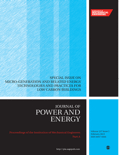
PROCEEDINGS OF THE INSTITUTION OF MECHANICAL ENGINEERS PART A-JOURNAL OF POWER AND ENERGY
Pioneering Discoveries in Power Generation and EfficiencyPROCEEDINGS OF THE INSTITUTION OF MECHANICAL ENGINEERS PART A-JOURNAL OF POWER AND ENERGY, published by SAGE PUBLICATIONS LTD, is a pivotal journal dedicated to advancing the fields of mechanical engineering and energy technology. With a history spanning from 1983 to 2024, this journal provides a respected platform for researchers and practitioners to disseminate findings that address contemporary challenges in power generation, energy efficiency, and sustainable engineering practices. As evidenced by its quarter ranking in Q3 within the categories of Energy Engineering and Power Technology, and Mechanical Engineering, it serves as a significant resource for academics aiming to enhance their understanding and explore innovation in these critical areas. While currently not an open-access journal, the research published here is invaluable for both ongoing education and professional practice, making it an essential read for anyone engaged in the engineering disciplines.
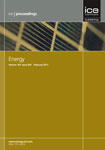
Proceedings of the Institution of Civil Engineers-Energy
Bridging theory and practice in energy management.Proceedings of the Institution of Civil Engineers-Energy is a pivotal journal published by Emerald Group Publishing Ltd, focusing on the dynamic fields of energy engineering and power technology. With an ISSN of 1751-4223 and an E-ISSN of 1751-4231, this journal stands at the forefront of advancing research from 2008 to 2024, encapsulating critical insights into energy systems, sustainability, and innovative practices within the energy sector. The journal holds a commendable position in Scopus rankings, especially in the categories of Energy Engineering and Power Technology, with a Q3 quartile ranking reflecting its growing influence and relevance. Though currently not Open Access, it provides valuable content for researchers and professionals seeking to explore emerging trends and challenges in energy management and renewable resources. Aimed at bridging the gap between theoretical frameworks and practical applications, this journal is essential for anyone invested in the transformation of the energy landscape.
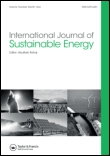
International Journal of Sustainable Energy
Advancing Knowledge in Sustainable Energy PracticesInternational Journal of Sustainable Energy is a premier peer-reviewed journal published by TAYLOR & FRANCIS LTD that serves as a vital platform for the dissemination of innovative research in the field of sustainable energy. With an ISSN of 1478-6451 and an E-ISSN of 1478-646X, this journal has established a significant reputation, currently ranked in the Q2 category across multiple disciplines such as Energy (miscellaneous), Fluid Flow and Transfer Processes, and Fuel Technology, reflecting its commitment to high-quality academic contributions. The journal has been Open Access since 2022, ensuring that research is freely accessible to a global audience, fostering collaboration and knowledge sharing. Positioned in the United Kingdom, the journal strives to address the critical challenges surrounding renewable energy and sustainability, appealing to researchers, professionals, and students alike. The Scopus rankings further enhance its credibility, showcasing its impact in the field with notable percentiles across various energy-related categories. With converged years from 2003 to 2024, the International Journal of Sustainable Energy remains a cornerstone for innovative research that seeks to pave the way towards a more sustainable future.

International Energy Journal
Empowering Sustainable Energy SolutionsInternational Energy Journal is a pivotal academic publication dedicated to advancing research and knowledge in the dynamic field of energy. Published by the REGIONAL ENERGY RESOURCES INFO CENTER in Thailand, this journal focuses on a broad spectrum of energy topics, including renewable sources, energy policy, and sustainable practices. With a recognized Q3 category ranking in the field of Energy (Miscellaneous) and a Scopus rank of #47 out of 73, it serves as a critical platform for researchers, professionals, and students eager to contribute to and stay abreast of the latest trends and developments in energy science. The journal, which has been in continuous publication since 2000, operates on an open-access basis, ensuring that its findings are accessible to a global audience. Researchers looking to publish their work in a well-respected journal with a growing impact factor will find the International Energy Journal to be an excellent choice for disseminating their studies and innovations in this essential field.

Journal of Modern Power Systems and Clean Energy
Pioneering Research for a Cleaner, Greener Future.Journal of Modern Power Systems and Clean Energy is a leading academic platform dedicated to advancing the fields of energy engineering, power technology, and renewable energy. Published by the prestigious STATE GRID ELECTRIC POWER RESEARCH INSTITUTE in China, this Open Access journal has been a significant contributor to the dialogue on sustainable energy solutions since its inception in 2013. With a Q1 ranking in both the Energy Engineering and Power Technology and Renewable Energy, Sustainability and the Environment categories, it serves a crucial role for researchers and professionals striving to push the boundaries of innovation in power systems and clean energy technologies. The journal’s impact is reflected in its impressive Scopus rankings, placing it in the top 10% of its categories, making it an invaluable resource for academia and industry alike. The Journal of Modern Power Systems and Clean Energy invites submission of original articles, reviews, and case studies that resonate with its mission of promoting sustainability and addressing contemporary energy challenges.
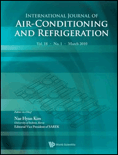
International Journal of Air-Conditioning and Refrigeration
Exploring the Frontiers of Air-Conditioning and RefrigerationInternational Journal of Air-Conditioning and Refrigeration is a leading peer-reviewed journal published by SpringerNature, focusing on pioneering research in the fields of air-conditioning and refrigeration technologies. With an Open Access model adopted since 2022, the journal ensures that high-quality research is freely accessible to a broad audience, facilitating knowledge dissemination and innovation. The journal covers a diverse range of topics, including control systems, fluid flow, and renewable energy applications, making it relevant for professionals and researchers within the disciplines of Control and Systems Engineering, Fluid Flow and Transfer Processes, and Renewable Energy. Positioned in the Q3 quartile across multiple categories as of 2023, it offers a valuable platform for emerging trends and sustainable practices in the industry. The Scopus rankings reflect its commitment to scholarly excellence, highlighting its role as an essential resource for those engaged in the development and implementation of innovative air-conditioning and refrigeration systems.

Advances in Energy Research
Shaping the Future of Energy with Groundbreaking Research.Advances in Energy Research is a prominent journal dedicated to the exploration and advancement of energy technologies and sustainable practices. Published by TECHNO-PRESS, this journal serves as a vital platform for researchers, professionals, and students in the energy field, featuring innovative studies and reviews that contribute to the body of knowledge surrounding energy efficiency, renewable resources, and the integration of new technologies. The journal holds a significant position in energy research and aims to facilitate the dissemination of groundbreaking findings and ideas that are pivotal for the transition toward a more sustainable energy future. Located in South Korea, with an ISSN of 2287-6316, it embraces an open access philosophy that ensures widespread availability of its content, further enhancing its impact in the academic community.
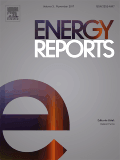
Energy Reports
Shaping Tomorrow’s Energy Policies Through Scholarly ExcellenceEnergy Reports, published by Elsevier, is a prestigious open access journal that serves as a vital resource in the field of energy research. Since its inception in 2015, this journal has swiftly ascended to become a key player in disseminating knowledge across various energy-related disciplines, evident from its impressive Q2 ranking in the miscellaneous category of Energy for 2023 and its notable position in the 78th percentile among over 70 journals in the general energy category, ranked 16th out of 73 on Scopus. Based in the United Kingdom, Energy Reports not only fosters innovative research but also promotes accessibility by providing open access to its articles, thereby ensuring that findings reach a global audience of researchers, professionals, and students. With a commitment to advancing sustainable energy solutions and technologies, Energy Reports plays a crucial role in shaping future energy policies and practices, making it an essential platform for scholarly communication in the ever-evolving landscape of energy research.